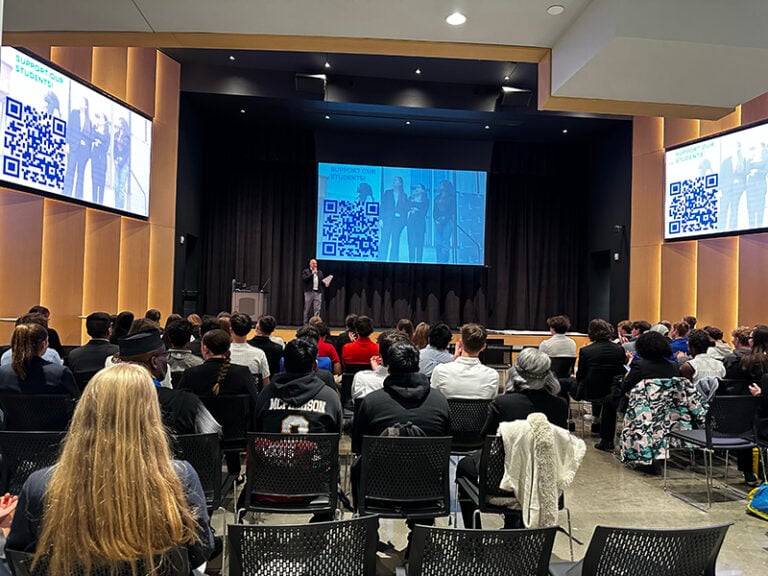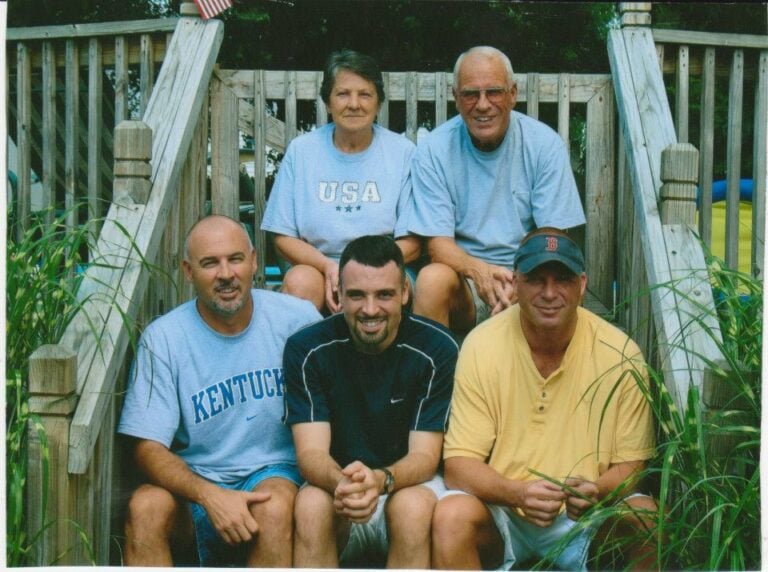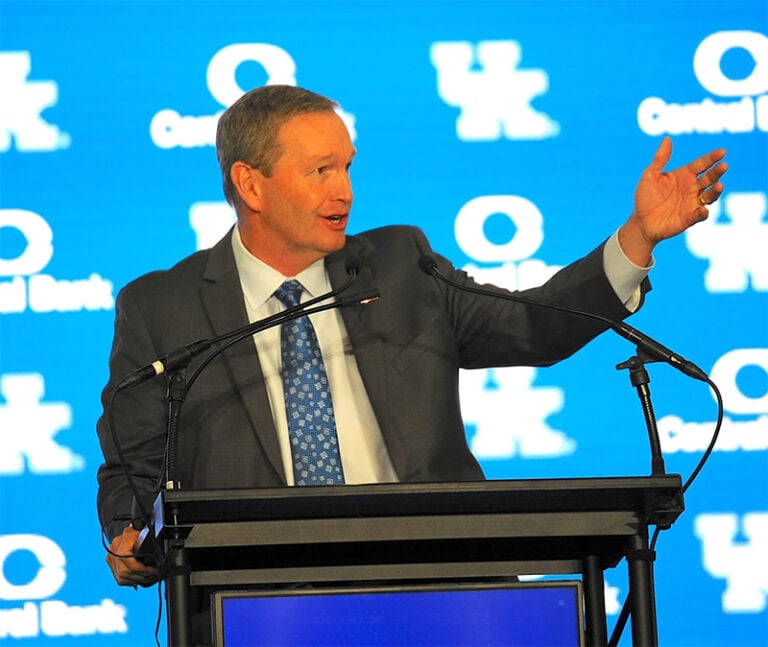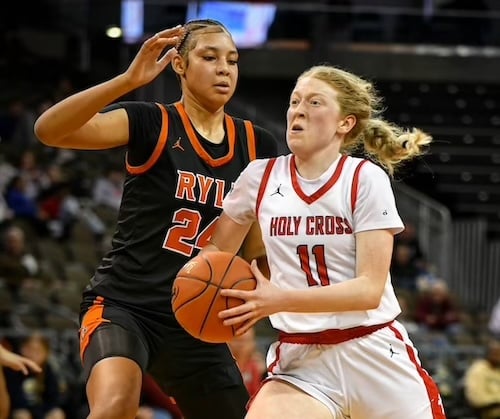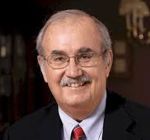With apologies to Howard Schnellenberger, I must say that anybody who guarantees an outcome in the sports world is on a collision course with humiliation, and the only variable is time.
So I’m not going to promise you that Lamar Jackson, the University of Louisville’s remarkable sophomore quarterback, will be the one whose name is called on Saturday afternoon when the 2016 Heisman Trophy winner is revealed at the annual ceremony in New York City.
But I will also tell you that I’ll be absolutely, positively shocked if the stiff-arm trophy goes to any of the other finalists – Deshaun Watson of Clemson, Jabrill Peppers of Michigan, or Oklahoma’s pitch-and-catch combination, Baker Mayfield and Dede Westbrook.
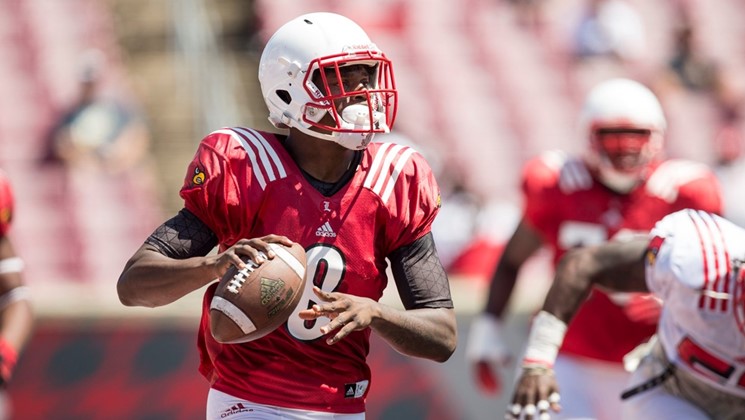
In the 35 years or so that I’ve been a Heisman voter, I’ve been surprised and/or disappointed a few times, most notably in 1998 when defensive star Charles Woodson of Michigan tore the thing from the grasp of Tennessee quarterback Peyton Manning.
I’ve also seen a lot of years where the only way to pick the winner was flip a coin. Take 1989, for example. Heads, it’s Andre Ware of Houston; tails, it’s Anthony Thompson of Indiana. Both were highly deserving. I voted for Thompson, but Ware won in the seventh closest Heisman vote ever.
This year, in U of L’s second game, Jackson leaped over a Syracuse defender and into the heart of the Heisman conversation. He became the runaway front-runner after engineering a 63-20 humiliation of Florida State and has never seen anybody approaching in his rear-view mirror.
It’s sort of like what Spend A Buck did in the 1985 Kentucky Derby. He jumped right to the lead, set fast fractions, and dared anyone to come get him. Nobody did, so he cruised down the stretch at Churchill Downs while his would-be rivals were already wondering what had happened.
In U of L’s last two games, losses to decided underdogs Houston and Kentucky, Jackson’s teammates let him down. There’s no other way to put it. The Cardinal defense gave up a total of 77 points, and the offensive line failed to give Jackson the protection he had enjoyed all season.
Since a team’s performance often is a part of the Heisman equation – Louisville’s Paul Hornung, who won in at Notre Dame in 1956, remains to only winner from a losing team – some Heisman watchers thought the door might have been opened a crack, especially for Watson, who had his usual brilliant game in leading Clemson over Virginia Tech in the Atlantic Coast Conference title game.
But it really didn’t.
With all due respect to Watson, who deserves a lot, he wasn’t the most exciting or productive player in college football this season. That distinction went to the Thrill from the Ville, who befuddled opponents all season with his darting, daring runs and his on-the-money passing.
So the only way I see Jackson not packing the trophy back to Louisville is if he’s hit by a bolt of lightning and announces that he doesn’t want to belong to any club that includes O.J. Simpson, the 1967 winner who still owns the Heisman records for most first-place votes and largest margin of victory.
I’ve already seen one blowhard proclaim this to be the weakest year for Heisman contenders he has ever seen. I prefer to look at it as a terrific year for team football more than individual football. Look at Alabama. The unbeaten, top-ranked Crimson Tide has more quality players than anybody in the nation, yet none glamorous enough to get invited to New York.
Nevertheless, there’s no getting around the fact that U of L’s loss to UK in Papa John’s Cardinal Stadium was devastating. Taking a little shine off Jackson’s season was the least of it. Had the Cards won, they probably would have finished in the Top 10 and received an invitation the Orange Bowl instead of the Citrus.
Never has a U of L team risen so high so quickly and fallen so low so quickly. Ranked No. 3 in the nation heading into the Houston game, the Cards currently stand at No. 13 in the Playoff Rankings and 15 in the Associated Press. And, so far, nobody has offered any plausible excuses for what went wrong.
The Monday after the game, U of L coach Bobby Petrino was still so upset that he walked out of a press conference after four minutes. He was offended by a question that most observers felt was innocuous. He looked childish and peevish, more like the Bad Old Bobby instead of the Good New Bobby that U of L fans were promised when Athletics Director Tom Jurich gave him a second chance.
If Jackson wins the Heisman, as I firmly believe he will, LSU’s defense will have added incentive against U of L in the Citrus Bowl. While neither Houston nor UK ran in the top 50 in total defense, he Tigers ranked 13th nationally. The message is clear: If U of L’s defense and o-line don’t come out of their coma, Jackson’s wondrous season will end with three consecutive losses.
But let’s get positive.
Nobody who played their college ball in Kentucky has ever won the Heisman, and only four times has the commonwealth had a player finish in the top five – UK quarterback Vito “Babe” Parilli, fourth in 1950 and third in ’51; UK tackle-linebacker-kicker Lou Michaels, fourth in 1957; and UK quarterback Tim Couch, fourth in 1998.
All teeth-gnashing about the last two games aside, the Heisman would be another symbol – and a very important one, at that – that the Cards have taken up permanent residency in college football’s big time.
A win by Jackson also would give him the opportunity to join Ohio State running back Archie Griffin (1974-75) as the only player to win it two years in a row. He can’t go to the NFL until after his junior season, and let’s pause to give thanks that college football has more intelligent eligibility rules than its basketball brethren.
Lamar Jackson is on a collision course with the Heisman Trophy.
I will not guarantee that it will happen Saturday, but if it doesn’t, I’ll be even more shocked and stunned than I was on Feb. 25, 1964, when a kid from Louisville named Cassius M. Clay Jr. knocked out Sonny Liston to win the world heavyweight boxing title.
Billy Reed is a member of the U.S. Basketball Writers Hall of Fame, the Kentucky Journalism Hall of Fame, the Kentucky Athletic Hall of Fame and the Transylvania University Hall of Fame. He has been named Kentucky Sports Writer of the Year eight times and has won the Eclipse Award twice. Reed has written about a multitude of sports events for over four decades, but he is perhaps one of media’s most knowledgeable writers on the Kentucky Derby








